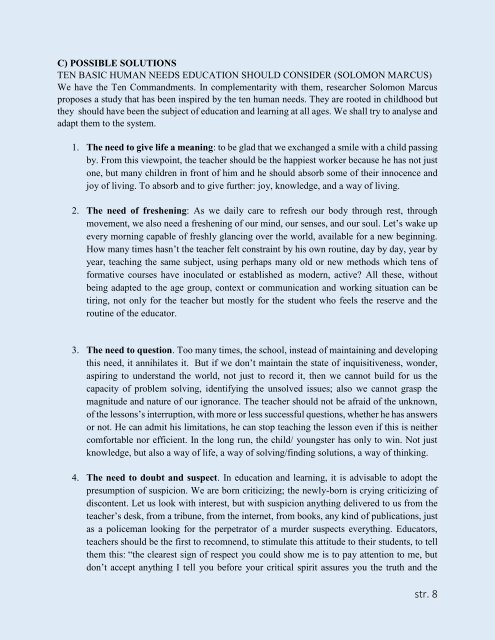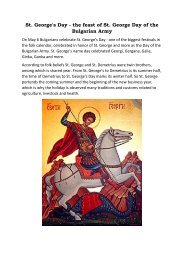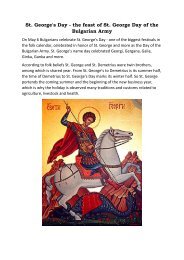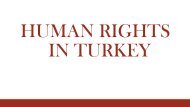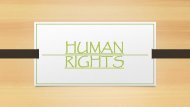Digital-magazine_1
You also want an ePaper? Increase the reach of your titles
YUMPU automatically turns print PDFs into web optimized ePapers that Google loves.
C) POSSIBLE SOLUTIONS<br />
TEN BASIC HUMAN NEEDS EDUCATION SHOULD CONSIDER (SOLOMON MARCUS)<br />
We have the Ten Commandments. In complementarity with them, researcher Solomon Marcus<br />
proposes a study that has been inspired by the ten human needs. They are rooted in childhood but<br />
they should have been the subject of education and learning at all ages. We shall try to analyse and<br />
adapt them to the system.<br />
1. The need to give life a meaning: to be glad that we exchanged a smile with a child passing<br />
by. From this viewpoint, the teacher should be the happiest worker because he has not just<br />
one, but many children in front of him and he should absorb some of their innocence and<br />
joy of living. To absorb and to give further: joy, knowledge, and a way of living.<br />
2. The need of freshening: As we daily care to refresh our body through rest, through<br />
movement, we also need a freshening of our mind, our senses, and our soul. Let’s wake up<br />
every morning capable of freshly glancing over the world, available for a new beginning.<br />
How many times hasn’t the teacher felt constraint by his own routine, day by day, year by<br />
year, teaching the same subject, using perhaps many old or new methods which tens of<br />
formative courses have inoculated or established as modern, active? All these, without<br />
being adapted to the age group, context or communication and working situation can be<br />
tiring, not only for the teacher but mostly for the student who feels the reserve and the<br />
routine of the educator.<br />
3. The need to question. Too many times, the school, instead of maintaining and developing<br />
this need, it annihilates it. But if we don’t maintain the state of inquisitiveness, wonder,<br />
aspiring to understand the world, not just to record it, then we cannot build for us the<br />
capacity of problem solving, identifying the unsolved issues; also we cannot grasp the<br />
magnitude and nature of our ignorance. The teacher should not be afraid of the unknown,<br />
of the lessons’s interruption, with more or less successful questions, whether he has answers<br />
or not. He can admit his limitations, he can stop teaching the lesson even if this is neither<br />
comfortable nor efficient. In the long run, the child/ youngster has only to win. Not just<br />
knowledge, but also a way of life, a way of solving/finding solutions, a way of thinking.<br />
4. The need to doubt and suspect. In education and learning, it is advisable to adopt the<br />
presumption of suspicion. We are born criticizing; the newly-born is crying criticizing of<br />
discontent. Let us look with interest, but with suspicion anything delivered to us from the<br />
teacher’s desk, from a tribune, from the internet, from books, any kind of publications, just<br />
as a policeman looking for the perpetrator of a murder suspects everything. Educators,<br />
teachers should be the first to recomnend, to stimulate this attitude to their students, to tell<br />
them this: “the clearest sign of respect you could show me is to pay attention to me, but<br />
don’t accept anything I tell you before your critical spirit assures you the truth and the<br />
str. 8


